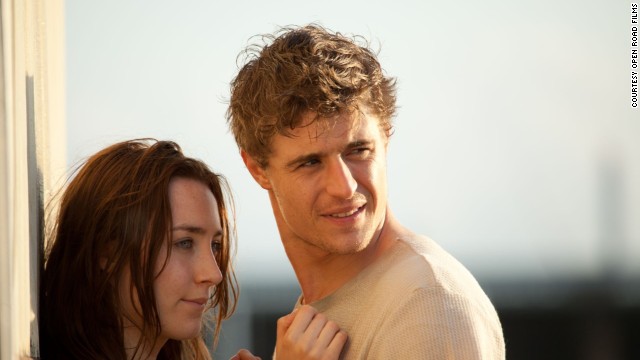
- "The Host" is the latest film adaptation of Stephanie Meyer novel
- Meyer's "Twilight" series were super successful
- Critic says "The Host" has a similar formula, but with aliens
(CNN) -- Can lightning strike twice for filmmakers hoping to cash in on the popularity of Stephenie Meyer's teen fiction?
The "Twilight" movies didn't wow critics, but they struck a chord with their target audience. I'm afraid "The Host" will only duplicate the first half of that experience.
The story borrows from Jack Finney's "Invasion of the Body Snatchers," which has been filmed several times -- by Don Siegel in 1956, Philip Kaufman in 1978 and Abel Ferrara in 1993, and more recently, but less successfully, by the Wachowskis as "The Invasion" in 2007. The idea that other people are alien automatons just doesn't go away.
Meyer's 2008 novel "The Host" departs from Finney's yarn by skipping forward a few years. The invasion is over, the body snatchers have won; only a handful of humans have escaped detection, subsisting off the map, scavenging for survival.
 'The Host' arrives in theaters
'The Host' arrives in theaters
This is also the first version willing to meet the aliens halfway: They may not be as sexy as vampires in Meyer's imagination, but they're about as benevolent as any extraterrestrial occupying power could be. In fact, they're "Souls," a higher form of consciousness who never lie, kill, or steal. Which makes you wonder how they annexed the Earth in the first place?
Andrew Niccol's heavy-handed adaptation gives rise to that question and several others: like why the Souls cannot track down the holdouts with their superior otherworldly technology -- or failing that, figure out that anyone wearing sunglasses probably merits cross examination (after they've been possessed by the Souls, human eyes turn a peculiarly virulent light blue).
Saoirse Ronan is Melanie, another of Meyer's divided "tweenagers," who falls into the hands of the Souls and is possessed by an alien named Wanderer ("Wanda" for short). Melanie is a holdout, though. She refuses to vacate her consciousness and carries on an internal debate with Wanda for most of the story.
Ronan is one of our most promising young actresses, but listening to her wrestle for command of her own brain made me yearn for Steve Martin's antic duels with Lily Tomlin in "All of Me." Martin's bisexual split personality spilled out into the way he held himself, the way he walked, and ate, and urinated. Ronan is more like a ventriloquist's wooden dummy, understandably unhappy but also unbending no matter who is inside her head.
Melanie gains the upper hand long enough to escape the Souls' surveillance and get away to a human sanctuary, a refuge deep inside a cavernous desert butte. (This network of caves is the most eye-catching thing in the movie.) Here she must convince her former friends and family that Wanda means them no harm -- one of several themes that will echo with "Twilight" fans.
Like Bella Swan, Melanie is courted by two rivals: one who was in love with her before her conversion, and another who feels strangely attracted to Wanda. "You wouldn't love me if you saw what I really looked like," she warns him -- though like horny young men anywhere, he's not unduly concerned in such philosophical imponderables.
As for Wanda, she develops an admiration for the grit and passion embodied by these mortals, and secretly wonders whether a little interstellar intercourse would be such a bad thing?
This is pretty silly stuff, "Twi"-lite if you will, but played with maximum solemnity, no discernible humor and minimal excitement. At least it's a modest improvement on Niccol's last foray into sci-fi allegory, the glum and pretentious "In Time," and "Simone" before that, but by now it's clear his rudimentary directing skills don't do his screenplays many favors.
To be fair, I enjoyed the dazzling hand-cranked solar panels that allow William Hurt's green-fingered old coot Jeb to farm wheat deep inside a desert crater, not to mention the hare-brained audacity of casting Hurt as a coot named Jeb. And who can resist the unusually crowded romantic triangle -- with four aching hearts but only three bodies to play for?
Too bad Niccol fails to flesh out the male suitors (Max Irons and Jake Abel -- both blandly anonymous), and he doesn't make much of the story's most intriguing character -- Diane Kruger's obsessive alien cop, The Seeker -- either. That leaves Ronan talking to herself as the film's dramatic linchpin, a prospect unlikely to get audiences worked up one way or the other.